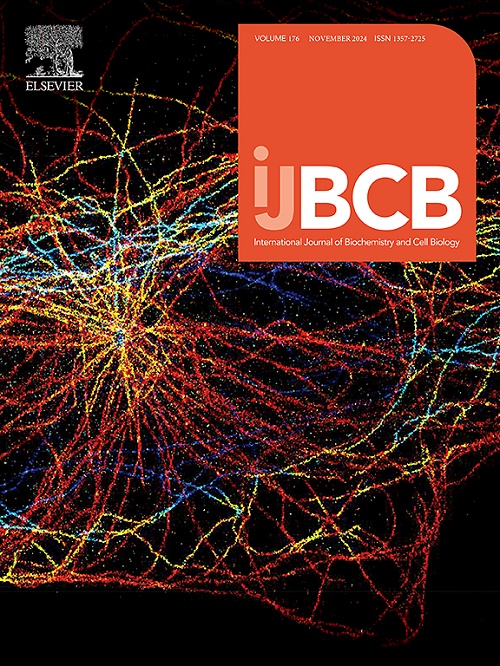β-Tricalcium phosphate nanoparticles induce macrophage polarization to M1-type through mitochondrial oxidative stress activation
IF 2.8
3区 生物学
Q2 BIOCHEMISTRY & MOLECULAR BIOLOGY
International Journal of Biochemistry & Cell Biology
Pub Date : 2025-09-25
DOI:10.1016/j.biocel.2025.106868
引用次数: 0
Abstract
β-Tricalcium phosphate (β-TCP), frequently employed for bone tissue regeneration, can induce inflammation during the initial phases of implantation within the organism. However, mechanisms by which β-TCP nanoparticles (NPs) cause this inflammatory response is rarely reported. This project aims to investigate the causes of the macrophage inflammatory response induced by β-TCP NPs. Here, macrophage-like RAW264.7 cells were co-cultured with conditioned medium containing β-TCP NPs to identify the pathways through which β-TCP NPs influence inflammation and polarization of macrophages. This effect is achieved by modulating mitochondrial oxidative stress in the immune microenvironment. The results demonstrated that β-TCP NPs caused mitochondrial swelling, increased intracellular calcium ions, reduced mitochondrial membrane potential, as well as decreased the level of adenosine triphosphate (ATP) and translocase of outer mitochondrial membrane 20 (TOMM20). These NPs further lead to mitochondrial oxidative damage. These alterations promoted the polarization of macrophage to M1-type. Exogenous mitochondrial-targeted antioxidants could block this M1-type macrophage polarization. The findings of this work suggest that β-TCP NPs induce macrophage inflammation and contribute to M1 macrophage polarization, primarily through the activation of mitochondrial oxidative stress. These insights could guide the development of improved β-TCP formulations to mitigate inflammatory responses in bone regeneration applications.
β-磷酸三钙纳米颗粒通过线粒体氧化应激激活诱导巨噬细胞向m1型极化
β-磷酸三钙(β-TCP)常用于骨组织再生,可在生物体内植入的初始阶段诱导炎症。然而,β-TCP纳米颗粒(NPs)引起这种炎症反应的机制很少报道。本项目旨在探讨β-TCP NPs诱导巨噬细胞炎症反应的原因。本研究将巨噬细胞样RAW264.7细胞与含有β-TCP NPs的条件培养基共培养,以确定β-TCP NPs影响巨噬细胞炎症和极化的途径。这种效果是通过调节免疫微环境中的线粒体氧化应激来实现的。结果表明,β-TCP NPs引起线粒体肿胀,增加细胞内钙离子,降低线粒体膜电位,降低线粒体外膜20转位酶(TOMM20)和三磷酸腺苷(ATP)水平。这些NPs进一步导致线粒体氧化损伤。这些改变促进巨噬细胞向m1型极化。外源性线粒体靶向抗氧化剂可阻断这种m1型巨噬细胞极化。本研究结果表明,β-TCP NPs主要通过激活线粒体氧化应激诱导巨噬细胞炎症并促进M1巨噬细胞极化。这些见解可以指导改进β-TCP配方的发展,以减轻骨再生应用中的炎症反应。
本文章由计算机程序翻译,如有差异,请以英文原文为准。
求助全文
约1分钟内获得全文
求助全文
来源期刊
CiteScore
8.10
自引率
0.00%
发文量
124
审稿时长
19 days
期刊介绍:
IJBCB publishes original research articles, invited reviews and in-focus articles in all areas of cell and molecular biology and biomedical research.
Topics of interest include, but are not limited to:
-Mechanistic studies of cells, cell organelles, sub-cellular molecular pathways and metabolism
-Novel insights into disease pathogenesis
-Nanotechnology with implication to biological and medical processes
-Genomics and bioinformatics

 求助内容:
求助内容: 应助结果提醒方式:
应助结果提醒方式:


